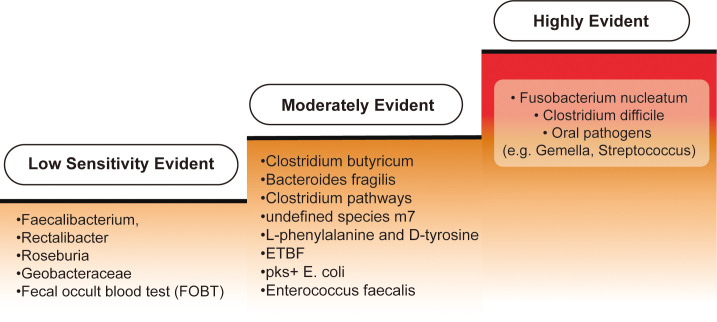Figure 4.
Categorization of biomarkers for colorectal cancer diagnosis. Biomarkers for colorectal cancer (CRC) diagnosis can be categorized into three levels of evidence based on their sensitivity and specificity. The "Highly Evident Biomarkers" group includes Fusobacterium nucleatum, frequently enriched in CRC patients and shown to enhance the sensitivity of the fecal immunochemical test (FIT) when used in conjunction with other diagnostic tools. Additionally, Clostridium difficile has been found to increase in both early- and late-onset CRC cases, suggesting a strong correlation with CRC development. Oral pathogens such as Fusobacterium, Gemella, and Streptococcus are also strongly associated with CRC. In the "Moderately Evident Biomarkers" category, Clostridium butyricum, Bacteroides fragilis, and Clostridium pathways—along with an undefined species, m7—provide moderate detection capabilities, albeit less prominent than the highly evident group. Elevated levels of L-phenylalanine and D-tyrosine are observed in amino acid metabolism specific to early-onset CRC samples. Furthermore, enriched bacteria such as enterotoxigenic Bacteroides fragilis (ETBF), pks+ Escherichia coli, and Enterococcus faecalis are found in CRC patients, though their independent or synergistic roles in CRC development are not fully understood. Lastly, the "Low Sensitivity Biomarkers" category includes reduced levels of Faecalibacterium, Rectalibacter, and Roseburia in late-onset CRC cases, though their absence alone is insufficient for a definitive diagnosis. Geobacteraceae, which exhibits a mutual exclusion relationship with other bacteria, shows weaker evidence for CRC detection. Finally, the fecal occult blood test (FOBT) has limited sensitivity and specificity, often yielding false positives, making it a less reliable biomarker.

